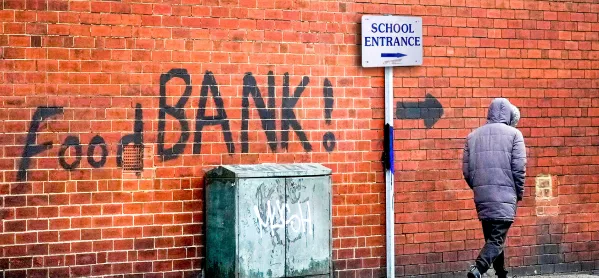Ofsted inspections should acknowledge that schools are often at the “frontline” of poverty, according to a report from University College London (UCL).
Schools have become the “first responders” to long-term poverty but the extra work that this involves - for example, setting up food banks - “is not funded sufficiently or recognised in judgements of the school”, researchers warn.
This leads to “potential increases in the disparities between schools in richer and poorer areas”, says the report by UCL’s Institute of Education.
The report, shared exclusively with Tes, adds: “The feeling of resignation among many school leaders at having to fill the gap left by other services, and caused by rising need, was striking.”
Authors Professor Alice Bradbury and Sharon Vince conclude that: “Schools are at the frontline of dealing with family poverty, and see themselves as continuing, after Covid, to prop up the welfare state”.
They recommend that schools should be supported to continue to deliver free food provision for families.
In addition, they say: “There should be greater acknowledgement of the role of schools in providing food and other essential goods for families. This might be through a reformed inspection system, but also more widely recognised in policy.”
Schools supporting pupils in poverty
The research, funded by the British Educational Research Association (BERA), is based on case studies of six primary schools in England that have a food bank or provide free food for families.
It found that Ofsted inspections and Sats results were “frequently mentioned as measures which needed to be contextualised by the work staff did in relation to family poverty”.
And headteachers in these schools felt that they faced an “unequal burden”.
One head, quoted anonymously in the report, said that Ofsted was “not interested” in the school’s food bank” and feared that it would be seen as a distraction from Sats results.
Another interviewee told researchers they were “reaching well beyond our core purpose as a school”.
The report also highlights how schools are providing clothing and bus tickets, in addition to food.
Some schools said that they were also providing free food for staff - particularly cleaners and teaching assistants - as well as for parents.
Earlier this year, leaders warned warned that teachers were having to use food banks and charitable assistance as the cost-of-0living crisis hit.
Professor Bradbury said the research revealed the work schools do ”to support not just children but their families, too”.
“This work needs to be recognised and funded, in the absence of other services.”
A Department for Education spokesperson said: “To recognise the pressures facing schools, in April 2022 we announced an £18 million increase in funding for universal infant free school meals to support with costs around food, transport and staff wages. This rate will be increasing by a further 5 per cent in 2023-24.
“This is on top of a huge uplift in overall school funding, which next year will be at its highest level in history - per pupil, in real terms - as measured by the IFS [Institute for Fiscal Studies], following the additional £2 billion of investment for both 2023-24 and 2024-25 in the autumn statement.”
Ofsted declined to comment.




